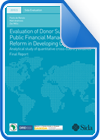
This country case study of Tanzania is one of a series of case studies that have been undertaken as part of an independent evaluation commissioned by the African Development Bank (AfDB) of the AfDB’s Policy Based Operations (PBOs).The aim is to support policy and institutional reforms that promote economic growth and poverty reduction. PBOs include balance of payments support, sectoral adjustment lending to support reforms in specific sectors, policy based lending for governance, general budget support and sector budget support. This evaluation has been designed to examine the application of PBOs used by the Bank over the period 1999–2009.

The Institutional and Policy Review (IPR) examines how the African Development Bank’s corporate strategy and specific policies and guidelines on Policy Based Operations (PBOs) have evolved and the extent to which these provide a clear and coherent framework for the design and delivery of PBOs. It also considers the evolution of the Bank’s organisational structure, systems and staffing arrangements for delivering PBL over the evaluation period (1999-2009)

This study was prepared as part of a broader evaluation of donor support to public financial management (PFM) reforms. It analyses quantitative evidence on the quality of PFM systems, and assesses factors that may have determined cross-country differences and variations in the quality of PFM systems over time

The literature review draws on academic and research literature and begins by examining the development of PBOs from structural adjustment lending (SAL) in the 1980s, to budget support in the late 1990s onwards: including the theoretical underpinnings of these various approaches. It looks at some of the key changes that have occurred in the aid environment over this period. One key change has been the move away from conditionality designed to bring about (or even “buy” reforms), to an approach to aid that is aimed at supporting government plans and priorities.